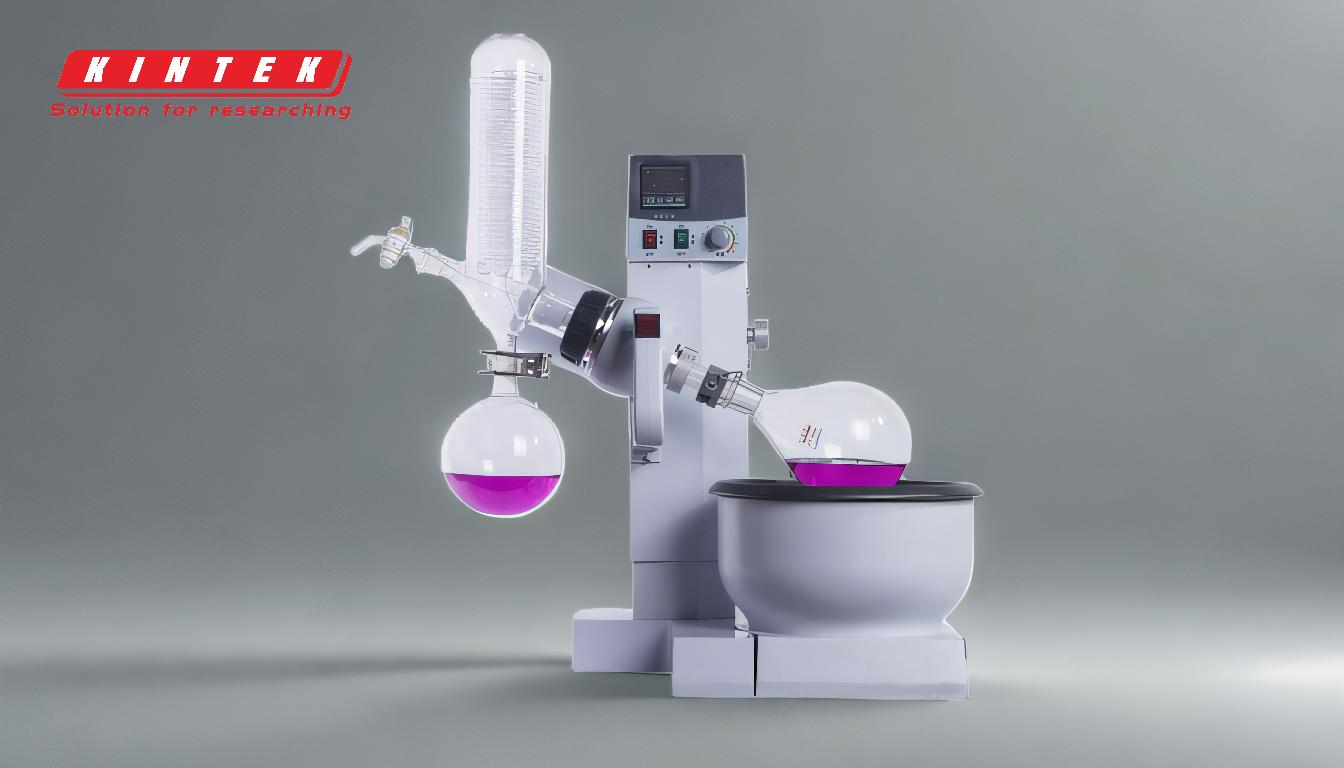Yes, you can evaporate water using a rotary evaporator. Rotary evaporators are designed to remove solvents, including water, from mixtures by leveraging reduced pressure and controlled heating. The process involves rotating the sample flask in a heated water bath, which increases the surface area and accelerates evaporation. A vacuum pump lowers the pressure, reducing the boiling point of water, allowing it to evaporate at lower temperatures. The evaporated water vapor is then condensed in a cooled condenser and collected in a separate flask, leaving behind the desired product in the evaporation flask. This method is particularly useful for concentrating solutions or isolating compounds without exposing them to high temperatures that could cause degradation.
Key Points Explained:

-
How Rotary Evaporators Work:
- Rotary evaporators operate through three main steps: evaporation, condensation, and collection.
- The sample is placed in a rotating flask immersed in a heated water bath, which increases the surface area and improves heat distribution.
- A vacuum pump reduces the pressure, lowering the boiling point of the solvent (in this case, water), allowing it to evaporate at a lower temperature.
-
Evaporation of Water:
- Water can be evaporated in a rotary evaporator because the reduced pressure lowers its boiling point, making it easier to remove at lower temperatures.
- The rotating flask creates a thin film of the liquid, increasing the surface area and speeding up the evaporation process.
- The evaporated water vapor is then condensed back into liquid form in the condenser and collected in a separate flask.
-
Advantages of Using a Rotary Evaporator for Water Evaporation:
- Lower Temperature Evaporation: The reduced pressure allows water to evaporate at temperatures below its normal boiling point, which is beneficial for heat-sensitive samples.
- Efficient Solvent Removal: Rotary evaporators are highly efficient at removing solvents, including water, from mixtures, making them ideal for concentrating solutions.
- Preservation of Sample Integrity: By operating at lower temperatures, the rotary evaporator minimizes the risk of degrading or altering the chemical structure of the desired product.
-
Considerations for Evaporating Water:
- Vacuum Pump Performance: A high-quality vacuum pump is essential for effectively reducing the pressure and lowering the boiling point of water.
- Temperature Control: The water bath temperature must be carefully controlled to ensure efficient evaporation without overheating the sample.
- Condenser Efficiency: A well-functioning condenser is crucial for effectively capturing and condensing the evaporated water vapor.
-
Applications of Water Evaporation in Rotary Evaporators:
- Concentration of Aqueous Solutions: Rotary evaporators are commonly used to concentrate aqueous solutions by removing water, leaving behind a more concentrated product.
- Isolation of Compounds: In chemical and biological research, rotary evaporators are used to isolate compounds from aqueous solutions without exposing them to high temperatures.
- Solvent Recovery: Rotary evaporators can be used to recover water or other solvents from mixtures, which can then be reused or disposed of properly.
In summary, a rotary evaporator is a versatile and efficient tool for evaporating water from mixtures. By leveraging reduced pressure and controlled heating, it allows for the gentle and effective removal of water, making it suitable for a wide range of applications in chemistry, biology, and industry.
Summary Table:
| Key Aspect | Details |
|---|---|
| How It Works | - Evaporation, condensation, and collection steps. |
| - Rotating flask increases surface area for faster evaporation. | |
| - Vacuum pump reduces pressure, lowering water's boiling point. | |
| Advantages | - Lower temperature evaporation for heat-sensitive samples. |
| - Efficient solvent removal and sample integrity preservation. | |
| Considerations | - High-quality vacuum pump and precise temperature control required. |
| - Condenser efficiency is critical for capturing evaporated water vapor. | |
| Applications | - Concentration of aqueous solutions. |
| - Isolation of compounds and solvent recovery. |
Want to learn more about rotary evaporators for your lab? Contact our experts today!














